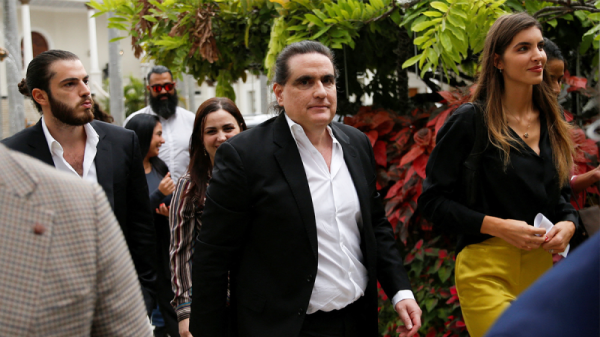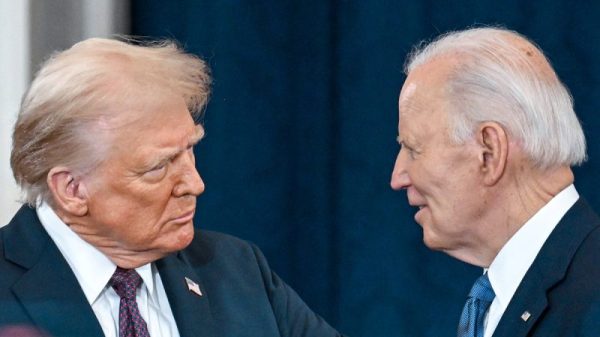Soon after New York State Supreme Court Justice Arthur Engoron announced that former president Donald Trump and his businesses would be on the hook for more than $350 million for engaging in fraud, a woman named Elena Cardone created a GoFundMe aimed at paying Trump’s judgment.
In the fundraising effort’s description, Cardone explains that she stands “unwaveringly with President Donald Trump” in opposition to “an attack on the very ideals of fairness and due process that every American deserves.” She called on “business owners and entrepreneurs to unite, to show our collective strength and resolve,” standing with Trump by helping to pay off his fine.
Cardone has put her money behind Trump before, contributing more than $10,000 to his 2020 reelection bid. Many of the other 22,500 or so donations (as of writing) are also likely to have come from previous Trump donors. This time around, they’ve cobbled together more than $1.2 million so far to help Trump meet his financial needs.
But those needs are very different from when people have contributed in the past.
As The Washington Post explained Monday, that $350 million-plus is only part of what Trump owes. There’s another $83 million-plus that he was ordered to pay for defaming writer E. Jean Carroll. Then there’s the interest, adding to the cost at more than $100,000 a day. New York Attorney General Letitia James is keeping a public running tally of what Trump owes — now more than $464 million.
+$114,553.04 = $464,805,336.70 https://t.co/gugrACDTpC
— NY AG James (@NewYorkStateAG) February 25, 2024
The interest alone demonstrates the problem. Cardone’s fundraiser began more than a week ago, during which time more than $1 million in interest has been added to what Trump owes. The GoFundMe is ostensibly aimed at raising the $355 million sum imposed by Engoron but in reality has barely raised enough to cover that interest. And, as you might expect, contributions have slowed from its initial burst: The fund has added less than $100,000 in the past two days, from Sunday to Tuesday.
Trump has been effective at getting people to give him money since he entered politics, certainly. After insisting to Republican voters during the 2016 primary that he could pay his own way to the nomination, he embraced individual contributions. During that cycle, his campaign raised more than $333 million, including about $87 million from small donors. In 2020, his reelection campaign pulled in nearly $774 million, including almost $380 million from small donors.
That latter total would be enough to cover what he owes New York. But that’s not going to happen.
First of all, he has only 30 days to come up with the total judgment if he hopes to appeal. Unless the court decides differently, he can’t simply avoid paying until appeals are resolved; he has to provide the total amount in the interim.
He might find a bond provider to help him do so, but, as The Post’s Jonathan O’Connell, Shayna Jacobs and Josh Dawsey wrote, that’s much trickier for Trump than it would be for others. Among other things, the judgment against him was specifically centered on the Trump Organization misrepresenting the value of its assets; what bonding company would feel confident that a building offered as collateral was worth what was being claimed?
Trump does have cash on hand, and potentially enough to hand over. But the Trump Organization also needs cash to operate its properties.
That 30-day window means that even if he could persuade supporters to give him money, he doesn’t have two years to do so. He was able, in the wake of his 2020 election loss, to persuade people to contribute more than $170 million in less than a month, money ostensibly focused on aiding his legal efforts. He would need nearly three times as much now, for a cause much less directly linked to his political ambitions.
Nor will the Republican Party bail him out. The party paid some of Trump’s bills soon after he left office, but that’s tricky with Trump still slowly working his way toward renomination as the GOP’s presidential candidate. A prominent member of the Republican National Committee is trying to prohibit such payments entirely, introducing a resolution that would keep the party from paying Trump’s legal bills. Not that the RNC has the cash anyway; it had only $8 million in the bank at the beginning of the year.
It should go without saying that the central issue here is the size of the penalty Trump owes. Bloomberg News estimates that there are 178 Americans among the world’s richest people, cumulatively worth about $3.7 trillion. The median net worth of these billionaires, though, is a more-modest $9.2 billion — meaning that just putting up the judgment imposed by Engoron would demand cobbling together about 4 percent of their net worth within a month.
Trump is not among those richest Americans.
It’s not clear what he’s going to do or even what options he has at his disposal. It’s also not clear what happens if the appeal is rejected and Trump loses that half-billion dollars for good. He would have to sell 890,000 pairs of his new gold sneakers to generate enough cash to pay the fine imposed by Engoron — not that he keeps all of the money from that branding deal.
Trump has fared very well over the past five-plus decades in getting people to give him money. He’s done particularly well when attempting to do so in the context of politics. But this amount, on this timeline? It’s an entirely new realm and one that, unusually of late, will require that he be on the hook personally.
Soon after New York State Supreme Court Justice Arthur Engoron announced that former president Donald Trump and his businesses would be on the hook for more than $350 million for engaging in fraud, a woman named Elena Cardone created a GoFundMe aimed at paying Trump’s judgment.
In the fundraising effort’s description, Cardone explains that she stands “unwaveringly with President Donald Trump” in opposition to “an attack on the very ideals of fairness and due process that every American deserves.” She called on “business owners and entrepreneurs to unite, to show our collective strength and resolve,” standing with Trump by helping to pay off his fine.
Cardone has put her money behind Trump before, contributing more than $10,000 to his 2020 reelection bid. Many of the other 22,500 or so donations (as of writing) are also likely to have come from previous Trump donors. This time around, they’ve cobbled together more than $1.2 million so far to help Trump meet his financial needs.
But those needs are very different from when people have contributed in the past.
As The Washington Post explained Monday, that $350 million-plus is only part of what Trump owes. There’s another $83 million-plus that he was ordered to pay for defaming writer E. Jean Carroll. Then there’s the interest, adding to the cost at more than $100,000 a day. New York Attorney General Letitia James is keeping a public running tally of what Trump owes — now more than $464 million.
+$114,553.04 = $464,805,336.70 https://t.co/gugrACDTpC
— NY AG James (@NewYorkStateAG) February 25, 2024
The interest alone demonstrates the problem. Cardone’s fundraiser began more than a week ago, during which time more than $1 million in interest has been added to what Trump owes. The GoFundMe is ostensibly aimed at raising the $355 million sum imposed by Engoron but in reality has barely raised enough to cover that interest. And, as you might expect, contributions have slowed from its initial burst: The fund has added less than $100,000 in the past two days, from Sunday to Tuesday.
Trump has been effective at getting people to give him money since he entered politics, certainly. After insisting to Republican voters during the 2016 primary that he could pay his own way to the nomination, he embraced individual contributions. During that cycle, his campaign raised more than $333 million, including about $87 million from small donors. In 2020, his reelection campaign pulled in nearly $774 million, including almost $380 million from small donors.
That latter total would be enough to cover what he owes New York. But that’s not going to happen.
First of all, he has only 30 days to come up with the total judgment if he hopes to appeal. Unless the court decides differently, he can’t simply avoid paying until appeals are resolved; he has to provide the total amount in the interim.
He might find a bond provider to help him do so, but, as The Post’s Jonathan O’Connell, Shayna Jacobs and Josh Dawsey wrote, that’s much trickier for Trump than it would be for others. Among other things, the judgment against him was specifically centered on the Trump Organization misrepresenting the value of its assets; what bonding company would feel confident that a building offered as collateral was worth what was being claimed?
Trump does have cash on hand, and potentially enough to hand over. But the Trump Organization also needs cash to operate its properties.
That 30-day window means that even if he could persuade supporters to give him money, he doesn’t have two years to do so. He was able, in the wake of his 2020 election loss, to persuade people to contribute more than $170 million in less than a month, money ostensibly focused on aiding his legal efforts. He would need nearly three times as much now, for a cause much less directly linked to his political ambitions.
Nor will the Republican Party bail him out. The party paid some of Trump’s bills soon after he left office, but that’s tricky with Trump still slowly working his way toward renomination as the GOP’s presidential candidate. A prominent member of the Republican National Committee is trying to prohibit such payments entirely, introducing a resolution that would keep the party from paying Trump’s legal bills. Not that the RNC has the cash anyway; it had only $8 million in the bank at the beginning of the year.
It should go without saying that the central issue here is the size of the penalty Trump owes. Bloomberg News estimates that there are 178 Americans among the world’s richest people, cumulatively worth about $3.7 trillion. The median net worth of these billionaires, though, is a more-modest $9.2 billion — meaning that just putting up the judgment imposed by Engoron would demand cobbling together about 4 percent of their net worth within a month.
Trump is not among those richest Americans.
It’s not clear what he’s going to do or even what options he has at his disposal. It’s also not clear what happens if the appeal is rejected and Trump loses that half-billion dollars for good. He would have to sell 890,000 pairs of his new gold sneakers to generate enough cash to pay the fine imposed by Engoron — not that he keeps all of the money from that branding deal.
Trump has fared very well over the past five-plus decades in getting people to give him money. He’s done particularly well when attempting to do so in the context of politics. But this amount, on this timeline? It’s an entirely new realm and one that, unusually of late, will require that he be on the hook personally.





















